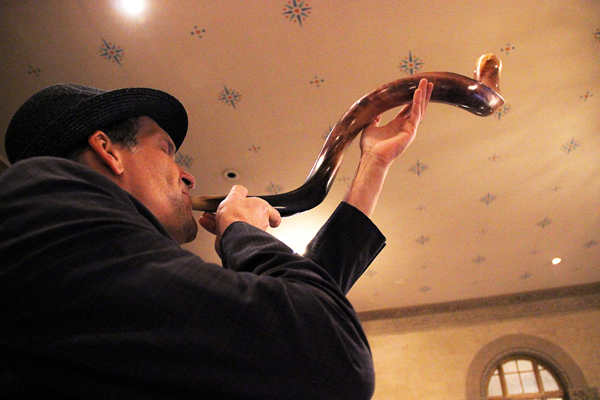
BY TEQUILA MINSKY | We’re everybody-friendly, God-optional and artist-driven,” said Amichai Lau-Lavie, spiritual leader of Lab/Shul.
Amichai leads his Rosh Hashanah services with inclusive and empathetic, yet challenging guidance. The stage is filled with musicians — on violin, flute, guitars and percussion — performing liturgical and world music melodies and rhythms. Prayers and music are accompanied by projections on a screen. This is an Amichai Lab/Shul service.
“We’re nomads,” Amichai declared. The location for this September’s Jewish new year observance, on Sun., Sept. 13, was quite different from the previous Lower Manhattan venues. At City Winery, at Varick and Vandam Sts., the ark for the Torah was a wine cask. This year, 5776, the services were held in an early-Romanesque auditorium on Upper Fifth Ave.
“It wasn’t big enough,” filmmaker Sandi DuBowski said of City Winery. DuBowski is known for his work on the intersection of L.G.B.T. people and their religion. He is currently making a long-term documentary on Amichai, sort of a “Hoop Dreams” and “42 Up” magnified.
Amichai directed Storahtelling — which mixes Judaism with the arts and new media — for years, and is now a rabbi-in-training at the Jewish Theological Seminary, graduating in May.
All 583 seats of the Academy of Medicine’s E. 103rd St. auditorium were filled for Rosh Hashanah. Plenty of worshipers from Downtown (the physical home of Lab/Shul) — including from the Lower East Side, the Village and Tribeca — made the trek, as did congregants from the Upper West and East Sides, Long Island, Queens and New Jersey. One regular flies from Sante Fe each year to take part.
Joining the worship team, musician Natan-el Goldberg travels from Israel to perform with guitar, percussion and a voice that makes you melt.
“I am just the medium of this music,” he said with total humility.
The services were streamed online.
Shira Kline, sporting a swath of bright-blue bangs, led the short family-friendly service for kids up to age 7, followed by activities, keeping them busy while parents worshiped.
The Storah (story plus Torah, acted out) Service for adults featured original and dramatized translation of the Torah into English, in three acts.
Wrapping up the morning service, Rabbi David Kline blew the traditional ram’s horn shofar, an ancient trumpet.
From the balcony, Marc Wishengrad’s sustained, embellished blowings from a long, twisted Yemenite shofar, bought in Borough Park, added to Kline’s traditional tones. Wishengrad is also a trumpeter.
Tribeca resident Jewel Bachrach said of the schlep to the Upper East Side, “It was worth the trip.”
After the service, many joined the worship team across the street in Central Park at the Harlem Meer, where Tashlich took place. In the Shedding Ritual, the previous year’s transgressions are symbolically cast off by throwing pieces of bread into a natural body of flowing water.

































